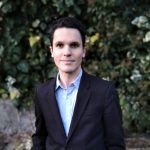Four Trinity researchers win highly competitive ERC Consolidator Awards
Posted on: 09 December 2020
Four researchers from Trinity have won highly prestigious European Research Council (ERC) Consolidator Awards.
These awards, announced annually and valued at €2 million each, go to emerging research leaders who are at the stage of growing their own independent research teams or programmes on the global stage.
The winners are Professors Marcus Collier (School of Natural Sciences), Thomas Chadefaux (School of Social Sciences and Philosophy), Stephen Dooley (School of Physics) and David O’Shaughnessy (School of English).
Marcus Collier, Assistant Professor in Urban Nature-based Innovation, will lead project NovelEco: Societal Attitudes to Urban Novel Ecosystems.

This will address a major gap in understanding about whether human contact with nature, especially ‘wild’ nature, can have beneficial social and personal effects.
NovelEco will thus create a new awareness of the transformative potential of urban wild spaces while advancing frontier science in the fields of urban novel ecosystems and social-ecological systems science.
Marcus Collier said:
“This project is a life-long obsession of mine and I am very grateful to the ERC for funding it. Besides gaining new insights into human-nature relationships, NovelEco will create a new data-gathering tool that will be free for everyone to use and which will provide useful ecological data beyond the end of the project.”
Thomas Chadefaux, Assistant Professor in Political Science, will analyse recurring patterns in the escalation and emergence of wars by asking: Does history indeed repeat itself? And, if so: Are there dangerous temporal patterns of escalation and conflict emergence that we should understand to avoid wars in the future?
His project, PaCE: The Patterns of Conflict Emergence: Developing an Automated Pattern Recognition System for Conflict, will use novel geometry-based pattern recognition methods to uncover recurring patterns of conflict escalation and explore how these might be utilised to improve our ability to forecast wars. 
Thomas Chadefaux said:
“PaCE aims to uncover the patterns that precede conflicts. Just as DNA sequencing has improved medical diagnosis, PaCE aims to advance our ability to forecast wars by detecting recurring sequences and developing an automated pattern recognition system for conflict and geopolitical crises.”
Stephen Dooley, Associate Professor of Energy Sciences, will pioneer fundamental research in the field of clean energy technologies with his project Mod-L-T: Models for Lignocellulose Thermochemical Conversion.
 To achieve this however, chemicals, fuels and energy derived from lignocellulose must compete in technical quality and price with fossil-derived products and there is a relative dearth of knowledge in this area at present.
To achieve this however, chemicals, fuels and energy derived from lignocellulose must compete in technical quality and price with fossil-derived products and there is a relative dearth of knowledge in this area at present.
Stephen Dooley said:
“Making materials and energy products from sustainable sources of plant matter, rather than fossil sources, is a key challenge towards decarbonising our economies. This project asks the question: ‘At the detailed molecular level, what is plant matter, and how do the details of its molecular structure influence what we can make from it?’
“By making detailed links between the plant matter’s chemical structure and its chemical reactivity, we will be able to make much more efficient use of it. This will facilitate the transition to a circular economy and a reduced reliance on fossil sources for chemicals, fuels, and energy.”
David O’Shaughnessy, Associate Professor in Eighteenth-Century Studies will undertake an ambitious digital humanities project: Theatronomics: the Business of Theatre, 1732-1809, which will apply financial and econometric analysis to the rich financial data of London’s major theatres.
Manuscript data for Covent Garden and Drury Lane—the two main theatres of Europe’s biggest city—will be analysed to incorporate the theatres’ underlying commercial operations into understanding the history of eighteenth-century theatrical culture. 
David O’Shaughnessy said:
“My project will bring cultural economists and theatre historians together to investigate manuscript archives of financial records held in the Folger Library, Washington D.C., and the British Library, London. Theatre historians currently have a limited sense of how culture was enabled or constrained by financial imperatives.
“By using novel econometric methodology, the project will reveal a hidden part of London’s social history and shed new light on the careers of the actors, playwrights, and managers of the Covent Garden and Drury Lane. THEATRONOMICS will help provide the basis for a new understanding of the history of eighteenth-century London theatre.”
These Consolidator Award successes put further shine on what has already been a particularly successful year for Trinity researchers in ERC competitions.
The four Consolidator Award winners join Advanced Grant awardee, Professor Dan Bradley, Starting Grant awardees, Claire Gillan and Alessandro Lunghi, and Synergy Grant winners Poul Holm and Francis Ludlow. Collectively, Trinity researchers have secured €19 million in ERC funding in 2020.
Congratulating the four new winners, Dr Patrick Prendergast, Provost of Trinity, said:
“It’s a great achievement for Trinity academics to win four of these highly competitive European Research Council grants totalling €8 million. It’s been a fantastic year for Trinity researchers and I’m especially pleased to see that these latest awards reflect the breadth of world-leading research taking place at Trinity.
“This funding will support Trinity researchers in delivering ambitious fundamental research projects and for Trinity to continue to compete with the very best universities in the world.”
In other positive research-related news, John Goold, Assistant Professor and Royal Society University Research Fellow in Trinity’s School of Physics, was highly commended in the Irish Research Council’s annual Researcher of the Year category.
Professor Goold is a theoretical physicist, focusing on the interface between quantum mechanics and far from equilibrium thermodynamics. You can read more about his research here.
